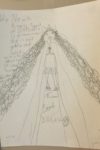
Old Man Vincilli had been old for a long time even before he moved out of the city into the hills. There, in his cabin, it was quiet and lonely. At night, he could even see the stars despite the light from the city.
The years passed. He walked the hills and ate simple meals and sat on his porch to listen to the birds and the clouds and the seasons. He was not happy, for a sadness had settled upon him before he moved from the city and age accustomed him to its weight. The world and he understood each other, though. He stayed upon his hill, in the narrow domain about his cabin, and the world strode back and forth across the earth and ignored him.
The years passed, and the nights, with slow swiftness, and Old Man Vincilli grew older still.
Then one night as he sat upon his porch, tired and yet not wanting to cede the day, a star, cold and bright in the darkness, began to fall. It slid down the heavens, its bright glow shining, its twinkle setting ablaze the atmosphere, a tail of incandescent diamonds trailing, a roar like wind rising, like waters surging, growing, growing, until it seemed to glow like day and the earth shook and a scream of sky tore past Old Man Vincilli and a ball of fire streaked down into the lake at the foot of the hill. Steam rose in great clouds.
Old Man Vincilli stared at the sight. With stiff movements he rose from his chair and followed the long winding path, step by step, down to the lake. Thick fog hung about the surface of water. He stood at the water’s edge and listened to the silence. He seemed to hear a cry from somewhere beyond sight. He waited, an emptiness in his soul, the hollow following such a vision.
Out of the fog drifted a vessel of crystal, a half sphere of glass and moonlight, and in it lay a child whimpering softly.
He stared at the child. She was dark as the night sky, and her cries rang clear as a bell in a sanctuary. With trembling hands he lifted her up and waited, waited for some other to come and claim her. No one came.
They lived together after that, Old Man Vincilli and the child. She grew swiftly, like the remembrance of youth. She skipped before him on the trails and her laughter shook the leaves. She ran into the forest and gathered berries and roots and mushrooms. She concocted dishes of strange flavor and caught fish with her bare hands. She delighted in Old Man Vincilli’s small world. She drank it up and grew strong, and her eyes flashed with the cold, piercing light of midnight clarity.
At night she sat upon the porch at Old Man Vincilli’s feet. She looked up at the few stars, and unbidden came the words of a song without beginning or end. She sang it in a voice of crystal. The air shimmered and the woods drew near, and nature seemed to listen with hushed breath. As she sang, tears came to Old Man Vincilli’s eyes, and he did not know whether they were from joy or from sorrow. He knew only that he ached, that he ached, and that she could not have hurt him more if she had pierced him with a blade, and that he felt desiccated when the song ended and she kissed him good night and fell asleep in her hammock.
Old Man Vincilli felt old the day he looked upon the girl and saw she was no longer a child. She gazed at him, her form straight and slender and dark, and she smiled innocently, but he saw that hesitation of self-consciousness, that terrible hint of self-knowing.
“Will you go home?” he asked.
“It is not time,” she said, some emotion darkening her expression for a moment.
It was not many nights later, as she finished her song and the last strains echoed among the grass and trees and moon, that her gaze lowered to the dull, ugly lights of the city upon the horizon. She remained silent. Old Man Vincilli felt anger, old, old anger, rising within him. “Do not look down,” he spat.
“Have they heard the song?” she asked.
“They can’t,” he answered. “There is noise, noise, noise. Honking, shouting, screaming, blaring, cursing, killing. They cannot hear it.”
He trembled and hot tears ran down the wrinkles of his face. She looked at him, and her tears sparkled beneath the moon.
“I will return,” she said.
Old Man Vincilli said nothing.
She left him. He sat day after day upon his porch. He did not enter the wood or walk along the lake. He brooded and he aged and he felt the millennia of the earth upon his shoulders.
When she returned, his eyes were weak. He shivered beneath the cold winter sky. He saw her beauty in his memory, but she sat worn and tired beside him. She stooped. She looked old, as old as he felt. He could not look at her long, for he loved her memory too strongly to bear the sight of her thin and haggard form.
“I sang for them,” she said.
“Did they listen?”
“I don’t know. But I sang. That is what I needed to do.” She touched his wrinkled hand and squeezed it.
“Sing for me,” he said. “I will listen.”
So she sang once more, and in her voice was not just beauty and longing but sorrow, and the sorrow made the words ache and blossom and shine more brightly with the hope it held.
Old Man Vincilli closed his eyes. He felt old, so very, very old. She held his hand firmly.
“Is it time to go home?” he murmured.
“Yes, Father. Yes. Let us go home.”








Recent Comments